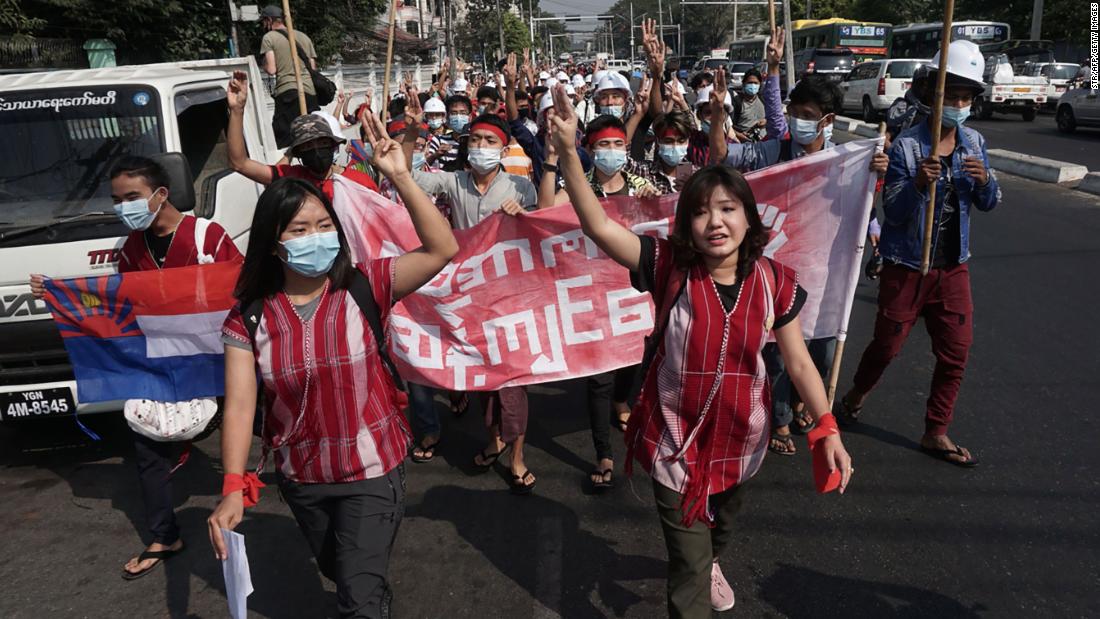Screams of “We demand democracy” could be heard in the crowd as they marched near downtown Yangon.
Dozens of police, some with riot gear, initially tried to block the protest route, forcing the crowd to change direction. Witnesses describe the expansion of the crowd, before appearing to disperse after several hours.
A series of minor and scattered protests are still ongoing. At Yangon University, several hundred young people, mostly, have gathered and continue to sing. Police with riot gear are present, but traffic is circulating in the area and roadblocks previously made by the police have disappeared.
During the previous large-scale march, passers-by could be seen making the three-finger salute in opposition to the army government, in apparent solidarity with the protesters. Others were seen applauding and distributing water to both protesters and the police, in what one witness described as a way to ease tension.
According to NetBlocks, real-time data from the network showed that connectivity dropped to 54% from normal levels and users reported difficulty staying online.
Witnesses told CNN that the internet connection was intermittent on Saturday, although some people were still able to broadcast video of the march in Yangon on social media platforms.
The drop in connectivity follows moves to block access to the social media platforms Facebook, Instagram and Twitter, as well as a number of important local news outlets.
Sudden capture of power
For more than 50 years, Myanmar – also known as Burma – has been governed by successive isolationist military regimes that have plunged the country into poverty and brutally suppressed any dissent. Thousands of critics, activists, journalists, academics and artists were routinely arrested and tortured during this period.
The recently deposed civilian leader, Suu Kyi, gained international prominence during her decades-long struggle against the military regime. When his party, the NLD, won a landslide victory in the 2015 elections and formed the first civilian government, many pro-democracy supporters hoped this would mark a break with the military regime of the past and offer hope that Myanmar would continue the reform.
It was widely reported that the NLD won another decisive victory in the November 2020 general election, giving it another five years in power and dashing the hopes of some military figures that an opposition party they supported could take power democratically.
The sudden takeover of power came when the new parliament was about to open and after months of growing friction between the civilian government and the powerful military, known as Tatmadaw, over alleged irregularities in the elections. The country’s electoral commission has repeatedly denied mass electoral fraud.
Hundreds of NLD lawmakers were detained in the capital Naypyitaw on Monday, where they traveled to take their seats. Since then, the junta has removed 24 government ministers and deputies and appointed 11 of its own allies as substitutes who will take up their positions in a new administration.
Analysts suggested the coup had more to do with the military’s attempt to reaffirm its power and the personal ambition of Army Chief Min Aung Hlaing, who was due to resign this year, than with serious allegations of electoral fraud.
“Facing compulsory retirement in a few months, with no path to a civilian leadership role, and amid global calls for him to face criminal charges in The Hague, he was cornered,” Jared Genser, an international human rights lawyer who previously served as a good professional lawyer for Suu Kyi, he wrote to CNN this week.
Monday’s coup was widely condemned internationally, with the United States calling on Myanmar’s military leaders to “immediately renounce the power they have taken, release the activists and officials they have held, lift all restrictions on telecommunications and avoid violence against civilians. “.
CNN’s Helen Regan and James Griffiths contributed to this report.
